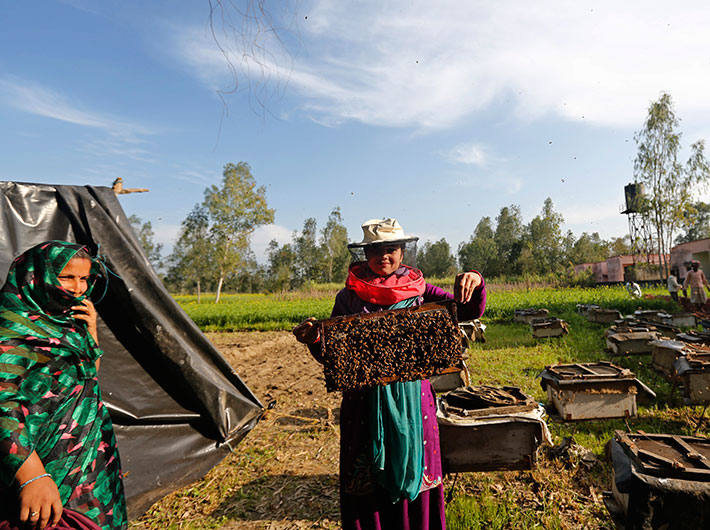From the suicides of indebted farmers to the buzz of prosperity, the journey of Taharpur in UP is an example for banks and rural entrepreneurs
Prem Singh Arya is a very busy man – as busy as the bees he keeps! On a regular working day, Arya not only has to manage his own farms and bees but also help around 1,000 others engaged in beekeeping in and around Taharpur village of Amroha district (earlier called JP Nagar) of western Uttar Pradesh.
Right from villagers to local traders, and now to exporters of honey, Arya handles it all as the local bank’s pointsman in the village farmers’ council (also called the farmers’ club). As the principal coordinator of the council, he is a critical link, not only between the villagers and the local bank, but also between the villagers and the market.
“My network connections have definitely been growing but my attachment with the people has remained as strong. That is why we have all been successful,” says Arya, 51, disregarding a phone that rings without relenting. “March is the time for honey to reach the market. These are calls from traders to fix the rate and time of delivery!”
The trade has been good over the years – from Rs 18 per kg in 2003, raw honey is now selling for Rs 140 per kg, Arya says. His efforts of over 15 years are finally bearing fruit.
Exactly what is a farmers’ council? And why is he selling others’ produce? Arya says he was certain that he had to take up farming on his family’s 15-bigha land in Karanpur Mafi village right after graduating from high school in 1982.
“Those were difficult times,” Arya recalls. “The villagers were all under the clutches of moneylenders who lent at exorbitant interest rates of 5 percent per month, which worked out to 60 percent a year!”
In 1994, he says, two young men committed suicide in nearby Tasiya village after being harassed by a moneylender, a local goon, over loan repayment. But the harassment didn’t end with the duo’s death – their families faced it thereafter, Arya adds.
Taking the bank route
It was thus “absolutely crucial to fight this menace”, and that is when Arya decided to try out the financial assistance programme offered by regional rural banks (RRBs) to self-help groups (SHGs).
He approached the local Prathama Bank branch in Taharpur village and after having understood the scheme, convinced his friends and neighbours to form their own SHG. That was 1996.
The group of 10 members then decided to begin a savings account with the bank by giving up one cup of tea every day, which sold for Rs 3 per cup then. Having built a successful savings habit, the members began taking loans from the bank at 10-12 percent annual interest without the hassles of having to deal with the local moneylenders’ wrath and began realising the importance of banking.
“This model spread like wildfire in nearby villages and many more villagers started approaching the bank to form SHGs and seek financial assistance,” Arya says. “The bank subsequently decided to create a farmers’ council to be the liaison between the institution and the SHGs, and I was made the principal coordinator.”
The most important job of the farmers’ council was to provide technical support to SHG members about various aspects of farming and other allied activities, as also tell them how to borrow and repay the loans. The council was not on the rolls of the bank and simply helped orchestrate a dialogue between the bank and the villagers.
“This model was beneficial to both sides. The bank started getting more business and villagers got easy access to formal credit,” says Arya matter-of-factly.
The smooth ride, however, soon entered a turbulent phase. First, while people agreed to join hands in groups to deposit and borrow money, they were not keen on doing the same job. So it became difficult for the farmers’ council to give technical support for a variety of activities, ranging from agricultural farming to poultry farming, and embroidery to candle-making.
Second, in an effort to create a rift between SHG members, the local moneylenders began luring them with offers of loans at cheaper interest rates. While they were not very successful in their efforts, some people did opt out of the SHGs.
In order to address the issue of heterogeneous nature of the SHGs, in 2002 Prathama Bank decided to give the villagers a seven-day vocational training in beekeeping, says Rajinder Singh, the bank’s Taharpur branch manager.
“Beekeeping, if done properly, can generate huge returns. So we discussed this idea with Prem Singh Arya and other council members, who in turn approached the villagers to participate in the training. Around 150 villagers participated in the training and on completion were sanctioned loans to begin work and this has been an on-going process.
“Today we are amazed at the results they have been able to deliver.”
For example, in Tasiya, the village where the two young men committed suicide in 1994 following harassment by local moneylenders, around 95 percent of the villagers took to beekeeping. Though only around 60 percent of the villagers are involved in the activity today, there is no unemployment. The village also does not have a moneylender.
Of the 18 villages around the bank’s Taharpur branch, 185 SHGs are today involved in activities such as cattle breeding and poultry farming, but beekeeping continues to be most popular – and the one with the highest returns.
The journey, and growth
Now 33 and assistant coordinator of the farmers’ council, Rajinder Singh took to beekeeping along with Arya and three others immediately after undergoing training in 2002. “We started this on a pilot basis with five boxes each. We expanded our scale a year later when we were able to make annual earnings of Rs 50,000,” he says.
In 2005, the farmers’ council decided to take a loan of Rs 4 lakh and set up a marketing unit after honey sales from Amroha district touched a record Rs 2 crore, of which one-fourth was produced by beekeepers in Taharpur and nearby villages.
While on one hand this group sells quality raw materials to the beekeepers and trains them on new techniques, on the other hand they become the market link for the villagers and buy all the honey produced by them to sell in the market.
The group now makes an annual net profit of above Rs 2 lakh that is shared equally among the five members.
“Our honey is much sought after by exporters because production has gone down in other states, while demand for Indian honey abroad has gone up. Today, exporters are even ready to pay Rs 150 to Rs 200 for each kg of raw honey that goes from our villages,” says Rajinder Singh, whose wife is also involved in beekeeping. The couple now owns 42 boxes of bees.
Success stories of the likes of Arya and Singh have meant more prosperity for the bank, which has opened 183 accounts for those engaged in beekeeping, with total deposits at over Rs 1 crore. In addition, loans for beekeeping worth Rs 1.62 crore remain outstanding as on date.
The bank has also opened 158 accounts for other SHGs to whom loans worth Rs 1.3 crore have been sanctioned, says branch manager Rajinder Singh.
“Our biggest victory,” he says, “is the change in the attitude of these people – they do not hesitate any more in coming to the bank.”
For Arya, meanwhile, it is the respect he has been able to earn that is overwhelming. What started for him as a crisis management activity has become a lucrative career option for many others, including his son.
(This story appeared in the March 16-31 print issue of the magazine)

